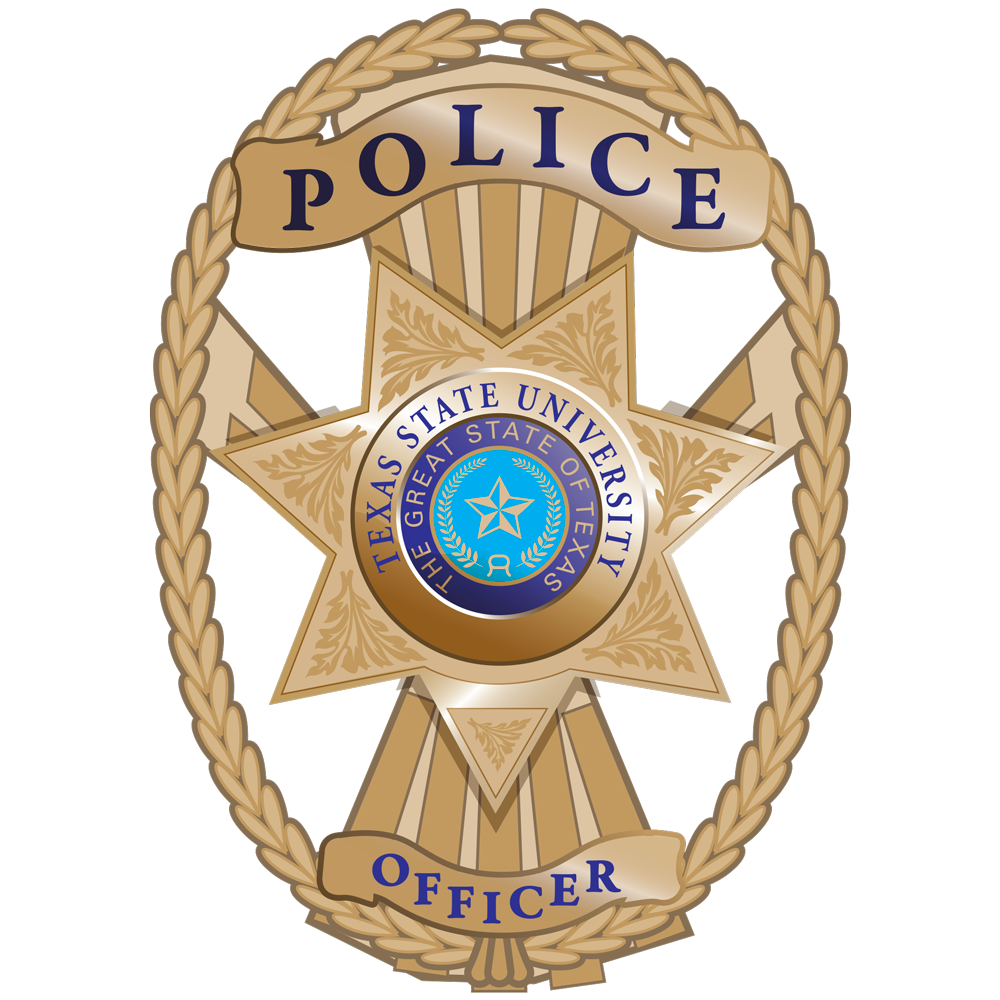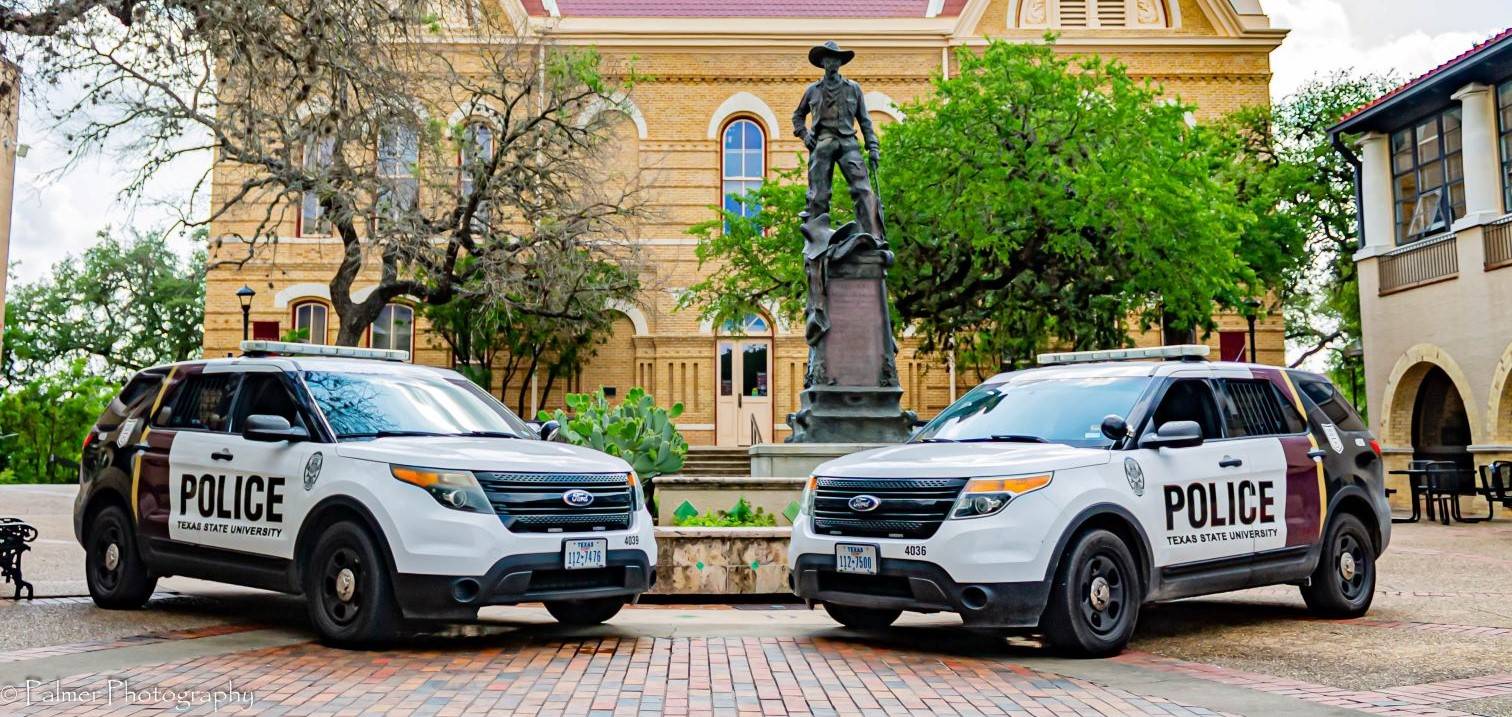Sworn Positions
Sworn Positions
Authorized by the Texas Legislature in 1899, Southwest Texas State Normal School opened its doors in 1903. In the years to come, the Legislature would broaden the institution’s scope and changed its name, in succession, to Southwest Texas State Normal College, Southwest Texas State Teachers College, Southwest Texas State College, Southwest Texas State University, and in 2003 to Texas State University. Each name reflects the university’s growth from a small teacher preparation institution to a major, multipurpose university. Located in San Marcos, Texas, the University plays a major role in the community.
The Texas State University Police Department (UPD) is an accredited agency that plays a critical role in the safety and security of all faculty, staff, students and visitors on campus. UPD is a high-performing team that demonstrates best practices in university law enforcement, while also being dedicated to providing a safe and conducive learning environment for all members of our university community.
UPD serves as the principle provider of law enforcement services to the campus and also regularly patrols the surrounding area as well. UPD’s 39 state-certified police officers enforce all city, state and federal laws, as well as university policies. The department has full law enforcement jurisdiction within the Texas State University Campuses (San Marcos and Round Rock), cities of San Marcos and Round Rock and any county where Texas State University maintains property.
Training
New officers selected must be commissioned by the Texas Commission on Law Enforcement (TCOLE). Once hired, each officer completes an intense and demanding field training program. Officers receive additional training throughout their careers. This training includes state-required training, department-mandated training and specialized training for individual officers or units.
Assignments
Police department employees work in one of two divisions; Operations or Support Services.
Operations Division: Patrol
Officers begin their careers in the operations division working on a patrol shift. Most officers in the department serve in the patrol division, making it the foundation of the department. Officers work on one of four shifts which are 12 hours in length and provides 24-hour coverage. This schedule affords patrol officers with every other weekend off (Friday, Saturday and Sunday).
Patrol officers provide law enforcement services to the main campus and surrounding area, STAR Park, Freeman Ranch, remote university offices, and Texas State University property throughout the San Marcos and Round Rock areas. These services include but are not limited to, responding to calls for service, apprehending criminal suspects, writing reports, conducting traffic enforcement, completing preliminary investigations, as well as other proactive law enforcement services. Officers patrol in marked and unmarked vehicles, on foot, and on bicycle.
Last year, the patrol division handled over 10,000 calls for service and had over 23,000 officer-initiated activities.
An important part of the Patrol Division is the Field Training Officers (FTOs). Made up of seasoned officers, our FTOs play a vital role in developing new officers by training these officers in the field.
The Administrative Sergeant oversees all department training and maintains each officers’ training file. The Administrative Sergeant works with outside agency instructors, as well as department members who are law enforcement instructors. Experienced officers may choose to become a law enforcement instructor and teach law enforcement classes for the department and outside agencies. Continuous training throughout an officer’s career can include classroom instruction, firearms training as well as scenario-based training.
Operations Division: Investigations
The Investigations Division is made up of officers who investigate crimes reported to the police department. Investigators receive specialized training to work on a wide variety of offenses including burglary, robbery, assault, sexual offenses and death investigations. Investigators may work to recover stolen property, conduct a forensic examination of a crime scene, obtain and serve search or arrest warrants and prepare cases to file with the district attorney’s office. Investigators also conduct detailed interviews with victims, witnesses and suspects.
The cases worked by our investigators take them to locations not only on campus but also throughout the cities of San Marcos and Round Rock. When necessary, investigators may also work throughout Hays and Williamson counties or anywhere else an investigation may lead them.
Support Division
The Support Services Division is made up of officers and civilians who work in law enforcement, community engagement and police communications.
The Community Engagement Team is made up of officers who specialize in working with the public to promote safety and better understanding between the community and police department. These officers work with community members and organizations on campus to provide public presentations for the campus community including students, faculty and staff. In 2018, the community engagement unit gave over 200 presentations.
The Support Services Division is also responsible for coordinating and scheduling officers for special events. Officers can sign up to work these events for overtime compensation. Special events include athletic events, university graduations, high school graduations, campus-sponsored events and private parties held on campus. In 2018, officers worked over 300 special events held on campus.
The police department houses a fully functional communications center with state-of-the-art radio and equipment. Communications Officers receive 911 emergency and non-emergency phone calls, dispatch officers via radio, monitor officer activity and oversee the fire and burglar alarm systems for the entire campus. The communications center is operational 24 hours a day, 7 days a week. The communications unit is staffed by a supervisor and eight communications officers.
Department Ranks

Officers make up the majority of the police department and can be found on patrol shifts, working as investigators in the Investigations Division and staffing Community Engagement. While the officer rank is not considered a supervisor, because of the nature of police work, officers have a great deal of responsibility and discretion.

Corporals can be assigned to any division within the police department. On a patrol shift, corporals serve similar roles to patrol officers but may take on a higher level of responsibility. Corporals also serve as field training officers, patrolling with and training new officers.

Sergeants are first-line supervisors in the department. On patrol, sergeants lead a shift of officers and may be the highest-ranking member of the department on duty. Sergeants are also found supervising detectives in the Investigations Division and leading the department’s training team as Training Coordinators.

Lieutenants are command staff level officers in the department. In the Operations Division, a lieutenant serves as the patrol commander, supervising the patrol shifts and their respective sergeants. A lieutenant also serves as a supervisor in the Investigations Division or in an administrative supervisory role.

Captains are executive command staff level officers in the department and report directly to the Chief of Police. Captains lead one of two divisions; Operations or Support Services. Captains are not only responsible for the supervision of their division, but also work on budgeting, long term planning and special events coordination.

The Chief of Police is responsible for overall command of the police department and its 74 employees. The Chief directly supervises the captains, the Accreditation Manager, Emergency Management Coordinator and an Admin III.
